#this culture of apathy is going to turn me into a super villain
Text
do my anti-genocidal views bore you? or have i offended you with them?? gosh, i am so sorry. i just can’t imagine why that is… it’s probably because i’m so ignorant and stupid. it definitely has nothing to do with you as a person!! i’ll have to work really, REALLY hard to unlearn this toxic behavior. but once i do, we can spread cruelty together!! hand in hand. as a team. ❤️
#this culture of apathy is going to turn me into a super villain#i’m so sorry i stopped posting about star wars for a second to talk about an ACTUAL GENOCIDE#to the longtime mutual i lost because of how much i post about palestine#go on and stick your head in sand then#i guess you’re not as “chaotically good” as you think#plus all the zionists i’ve encountered online & in real life#y’all need to get a grip because genocide is always bad. yes even when the victims aren’t white.#free palestine#palestinian children#children of palestine#palestine genocide#save palestine#help palestine#end israel's genocide#end israeli terror#end israeli apartheid#end israeli siege#end israeli occupation#stop israel#israel is committing war crimes#israel is a war criminal#israel is committing genocide#anti zionisim
4 notes
·
View notes
Text
More about my morally-grey heroines and their messed-up relationships
I wanted to elaborate on this post I wrote about D&F and BFS, but it turns out that adding readmore links to reblogs is a PITA, and I just now that this is gonna turn into a fucking novelette.
So here we go.
Time to go into some detail about this!
Let’s define our terms:
“Decline and Fall” is my 120K+ series of loosely chronological, interconnected short fics, set in a tiny fandom for a visual novel that’s been in alpha development since 2015. For the record, the word count disincludes unfinished drafts, and stories that I’m holding back because they’re based on canon spoilers.
“Blood from Stone“ is my 100K unfinished Skyrim WIP, which began as a response to a kink meme prompt, and is not so much a rarepair as a non-existent one.
Both of these stories centrally feature young female protagonists and their sexual relationship with a much older man. Both heroines are... “grey” to say the least.
Let’s compare our fandoms, shall we?
Skyrim is a juggernaut fandom for a super-popular RPG which is part of a 30-yo franchise. The setting is moderately dark and casually sprinkled with murder cults, cannibalism, secret police death squads, and the prison industrial complex. The player character can be a thief and a murderer and everyone just learns to be okay with it because the only alternative is a fiery apocalypse. They also rob graves for the lulz.
Seven Kingdoms: The Princess Problem is a pinkie-toe-sized fandom for a hybrid RPG and dating sim where attractive young people flirt and date for the purpose of brokering world peace. The setting is one where you can actually broker world peace effectively. The player character can perpetrate a fair amount of proxy violence, but maintaining a good reputation dishonestly is legitimately difficult.
Now, let’s compare our heroines:
Corinne is a 24-year-old bounty hunter who became a folk hero, a soldier, and a cult assassin. She’s living alone and working for a living since she was 18. She’s never been in love, but she’s had multiple sexual and romantic relationships in the past. I deliberately wrote her as being very sexually confident and self-assured. She also has combat training, magical training, her special Dragonborn powers, and an incalculable amount of social clout. By every metric, she’s a powerful character. Though she can talk her way out of a tight spot (all my favorite characters can), she can also fight her way out.
Verity is (at the beginning of D&F) not yet 18 years old. She’s a princess from a very conservative kingdom who was raised to become a barter bride in a diplomatic marriage. The values that were passed to her were duty, tradition, and absolute obedience. Her primary skills are social, charisma, eloquence, and persuasion. Then she was dropped into the deep water of a diplomatic summit and had the weight of future history put on her shoulders, without ever having been taught how to make her own decisions or live with her regret.
To sum up, we have one hyper-competent, confident, and independent badass, universally recognized as powerful and dangerous, and then we have someone who’s basically a deconstruction of a traditional fantasy princess.
Okay, what about the more specific setting within the game world?
BFS is set in Markarth, arguably the most corrupt city in Skyrim, and the site of a localized war, on top of the 2-3 other wars that Skyrim has going on. The city is controlled by the cartel-like Silver-Blood family, and their enemies are swiftly and brutally eliminated. The rule of law is a joke. When the player character arrives at Markarth, they witness a chain or murders and are drawn into a conspiracy that sees them sentenced to life in prison for a crime they didn’t commit. The ruling elite suppress the native underclass by a variety of inventive methods. The roads into the city are controlled by the remnants of a violent but failed uprising, and this uprising is actually the origin story of Skyrim’s entire civil war storyline.
D&F is set in Revaire, explicitly the most violently war-torn of the seven kingdoms. Once the epicenter of a conquering empire, it was a country full of arts and culture, until a bloody coup slaughtered the entire royal line and instituted a new and more brutal regime. The new regime is on shaky grounds and foresighted people predict its imminent fall to rebel forces. So much, so canon. In D&F, I made a point of developing the new royals and their small coterie of supporters, as well as illustrating their constant struggle to conceal how widely reviled they are by the populace, and most of the former nobility. Their apathy to the plight of the common people is underscored in contrast to Verity’s compassion, which is ridiculed as a sentimental feminine affectation.
I’m attracted to certain themes, as you might have noticed.
Now, we get to talk about love interests.
Thongvor Silver-Blood is rather anemically characterized in Skyrim’s canon, so much of the information that I include in BFS is inferred. From his limited number of dialogues in the game, we know that he’s politically ambitious, a Stormcloak supporter, easily angered, and that he has one legitimate friend in the city. Like most Skyrim characters of his age bracket, he served in the Great War. He’s defined by his relationship to his generational cohort. In BFS, he’s def8ined in contrast to his brother. Thonar is comfortable being thought of as a villain. Thongvor still needs to believe that he’s the good guy. And I’m gonna get more into that in later chapters, too.
As a love interest, he’s initially in awe of Corinne, and always genuinely adoring, but more than a little jealous and possessive. BFS is not a story about love redeeming bad men (don’t get me started), but Thongvor shows different sides of his personality to different people, and the side that Corinne gets to see is much nicer than what most people do.
Hyperion Asper is a character of my own devising, whose existence in 7KPP canon is purely implied. We know his children, Jarrod and Gisette, and we knew that he organized a coup to seize the throne. I posit him as a tyrant and unrepentant child-killer (not directly stated in D&F, at least not yet). He’s ruthless and manipulative and his sole purpose is maintaining a sense of personal power. I structured him as the bad example that Jarrod tries -- and fails -- to live up to.
As a love interest... look, he’s a man who’s cheating on his wife with his son’s wife. He seduces Verity and manipulates her, and takes a special delight in pushing her buttons. All his compliments to her are mean-spirited and back-handed. He’s also jealous and possessive... which is especially pathetic, since he’s jealous of his own son, whom Verity doesn’t even like. His rage is a constant implied undercurrent in the narrative.
And the relationship dynamics themselves?
Corinne kisses Thongvor, proposes marriage to him, and then sleeps with him before riding off into mortal danger. She’s fond and affectionate, but she shies away from intense emotions, whether negative or positive. Since they spend most of their time apart, their marriage has been defined by Thongvor yearning like a sailor’s wife, while Corinne ran around doing violence and crime. They only just had their first fight. It will change when they get to spend some more significant time together... but on the whole, their marriage is fairly happy, and the emotional dynamic favors Corinne -- so far. It’s not a pure gender reversal, but that element is definitely dominant.
Hyperion starts seducing Verity on their very first meeting, and relies on a combination of magnetic attraction and Verity’s inexperience in life to keep her coming back, against her better judgment. Their relationship is mutually defined by a combination of attraction and resentment of that attraction. The danger of the situation is an essential element, to the point where it’s hard to imagine their affair would survive without it. It’s a puzzle and a battle, a source of fascination but not of comfort. There’s lust involved, and curiosity, but not a shred of love or even like. The closest thing to genuine affection is when Verity briefly imagines that there could be a version of Hyperion she actually liked, cobbled from his various, hidden good qualities. Any trappings of a genuine relationship are deliberately discordant.
I have tried, more than once, to imagine an alternate universe in which these two could be happy. It can’t be done. they are a study in dysfunction.
So where’s the similarity, with all these differences outlined?
Corinne’s choice to marry into the Silver-Blood family makes her complicit in their rule of the Reach, corrupt and reactionary as it is. Her reluctance to accept being called by their name reflects a reluctance to confront unpleasant truths that’s fundamental to her character. Choosing to be one of them affects and will continue to affect how other people see her, mostly negatively, and mostly without her being aware of it. Being Thongvor’s wife has gained her enemies. The fact that she doesn’t share his more reactionary views is something that they’ve both chosen to elegantly ignore, but the rest of the world won’t be so generous.
Verity’s choice to marry into the Revaire royal family makes her complicit in their violence against the forces rebelling against them, albeit in a more subtle way. Her personal dislike of Jarrod and the fact that their marriage was purely political will not absolve her in anyone’s eyes. Neither will her compassionate and charitable character, which can only be seen as a fig leaf to the Revaire royals’ general brutality. She has lost at least one good friend -- who will never see her the same way, since she chose to throw her lot in with his enemies. She will go down in history as an Asper wife -- but if she’s lucky, not just as that.
Both Corinne and Verity choose to accept some of the violence of the system that they live under, in order to serve their own lofty, long-term goals. Both of them are more image-driven than they care to admit, and though they are genuinely caring and compassionate, they will readily sacrifice compassion in service on their goals. They are queens (or queen-like figures), one-degree-of-separation members of the ruling class, implicated but not directly in control.
And their relationships serve to highlight what they are willing to accept, even though it goes against their conscience.
Is there a conclusion to be drawn here?
Sort of. I want to write about power, compromise and complicity. For whatever reason, it turns out that yw/om relationships are... a really good vehicle for exploring that. I can’t really explain why that is, just yet. I just... have had these thoughts floating, unstructured, in my head for months on end. I needed to get them out on paper, and give them some semblance of order.
I don’t even know why anyone but me would read this, as long and meandering as it is. But having it accessible might be of use to me.
#blood from stone#decline and fall#train wreck verity#i don't know why anyone would read this#it's nearly 2k words#and it has no real conclusion#hazel's d&f/bfs meta spiel
6 notes
·
View notes
Text
Unpacking the Mother of Skeletons

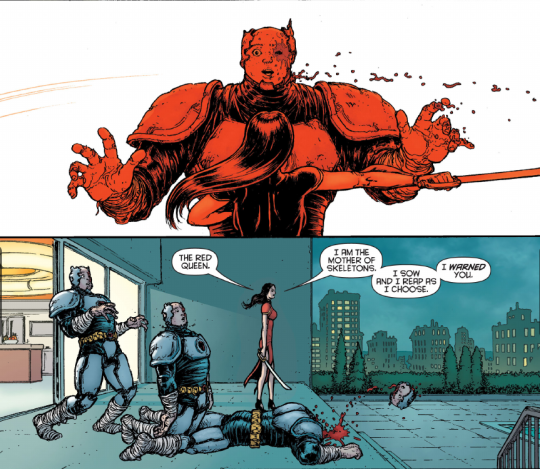
So I was just talking to some friends about this page and those references, and my psychology degree-possessing butt started explaining the wire mommy reference, which led me to researching the other references, and now I’m going to unpack them here for your benefit.
Before I do this, let me be clear that I am not agreeing with Grant Morrison or his portrayal of Talia nor am I agreeing with this use of these cultural, religious and social sciencey references. Just trying to break down what he’s getting at here.
Ahem.
So the context is this: Morrison’s Talia is 1. On a rampage of destruction because Bruce won’t date her and 2. Rejecting Heretic’s desire for her love and approval. Noteworthy: Heretic is Damian’s clone, so he is her genetic son.
Okay, here we go... in order, except for Kali which is last because boy is that a reference to unpack.
Tiamat: Okay so Tiamat is a goddess, in this case the ancient Mesopotamian goddess of creation, the mother of gods and monsters. She gives birth to the gods, but her husband realizes they want to depose him, so he wars against their children and their children destroy him, and then Tiamat wages war on their children. She is ultimately killed but not before creating the dragons who have poison in their veins instead of blood... but anyway I’m pretty sure the point he’s getting at is that her progeny rebels against her and she in turn wages war on them. This may also link back to the final bits of Batman Inc where Ra’s is set to unleash Damian’s clones - Talia’s unnatural children. Dragons with poison instead of blood, metaphorically.
Medusa: This is a stupid reference because the actual myth (at least the ones I’ve personally encountered) is that Medusa was r_ped in the temple of Athena. And Athena decided to act like a Greek God does, blaming the victim and cursing her to become a monster. Not super relevant except that Morrison has previously referenced this as the story of a beautiful woman who became a monster after her love was rejected - no idea where he got that from, but I think that’s fairly self-explanatory in the context of a Talia who has gone warpath because Bruce won’t date her.
The Wire Mommy: So I’m pretty sure this is a reference to the Harry Harlow rhesus monkey studies in the 1930s. So basically this was a study conducted in, I believe, the University of Wisconsin-Madison, where Harlow got some babby rhesus monkeys and removed them from their mothers and placed them in one of two primary environments:
An inanimate substitute mother made of wire holds food and a similar substitute made of terry cloth is without food.
An inanimate substitute mother made of terry cloth holds food and a similar wire mother does not have food.
Okay so the findings of this study were basically that the baby monkeys didn’t like the wire mother. In the case where the food was with the wire mother, they would go over and eat and then dash it over to the terry cloth mother and cling to that one.
What I gather from this, especially in the context of the above where Heretic is looking to Talia to love and nurture him, is that she’s saying that, despite having given him life and physically supported him (in other words, having the metaphorical food), she has no warmth or love for him. She is made of wire and without comfort or softness.
The Red Queen: I’m not superfamiliar with the Alice books beyond Wonderland so I did look this up on Wikipedia as well. Therein lies this quote from Carroll:
The Red Queen I pictured as a Fury, but of another type; her passion must be cold and calm - she must be formal and strict, yet not unkindly; pedantic to the 10th degree, the concentrated essence of all governesses
So, again, a comparison between Talia and a cold, dispassionate anger/hatred, and a female/maternal figure without warmth.
Mother of Skeletons doesn’t seem to be a specific reference - if you’ve got one, feel free to drop that on me, too, but I couldn’t find anything. I’m guessing it’s another way of reiterating this point that she is a destructive maternal figure who devours or destroys her unworthy children.
And finally...
Kali: Kali is a major Hindu deity, the wife of Shiva, and one of the more famous Hindu gods. Please note I am not Hindu, I’m not going to front as some kind of expert and if you know better than me, feel free to correct me. Anyway, Kali has many aspects, some of which are extraordinarily destructive and some of which are less so. To find out which one he’s specifically referencing all we need to do is look at the art, though:
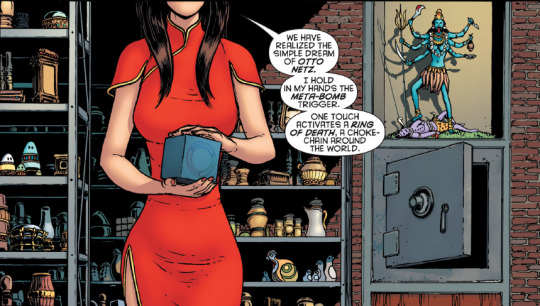
Kali’s most common pose in paintings is in her most fearsome guise as the slayer of demons, where she stands or dances with one foot on a collapsed Shiva and holds a severed head. She wears a skirt of severed human arms, a necklace of decapitated heads, and earrings of dead children, and she often has a terrifying expression with a lolling tongue which drips blood.
--Ancient History Encyclopedia
So okay looking at Wikipedia because I’m lazy... some relevant references, and you’ll see how the other names she gives for herself back this up:
Rāmprasād comments in many of his other songs that Kāli is indifferent to his wellbeing, causes him to suffer, brings his worldly desires to nothing and his worldly goods to ruin. He also states that she does not behave like a mother should and that she ignores his pleas:
Can mercy be found in the heart of her who was born of the stone? [a reference to Kali as the daughter of Himalaya]
Were she not merciless, would she kick the breast of her lord?
Men call you merciful, but there is no trace of mercy in you, Mother.
You have cut off the heads of the children of others, and these you wear as a garland around your neck.
It matters not how much I call you "Mother, Mother." You hear me, but you will not listen.
To be a child of Kāli, Rāmprasād asserts, is to be denied of earthly delights and pleasures. Kāli is said to refrain from giving that which is expected.
So, a mother who, having been born of stone herself, lacks mercy and warmth. Given Morrison’s take on Talia’s background and her relationship to Ra’s... self-explanatory pretentious reference. But that’s not all:
Vamakali is usually worshipped by non-householders. The pose shows the conclusion of an episode in which Kali was rampaging out of control after destroying many demons. Shiva, fearing that Kali would not stop until she destroyed the world, could only think of one way to pacify her. He lay down on the battlefield so that she would have to step on him. Seeing her consort under her foot, Kali realized that she had gone too far, and calmed down.
Okay this is super relevant because one thing that people often miss about Morrison’s Talia is that her acts of destruction are ultimately meant to get Bruce’s attention. She undertakes this villainous rampage because he only pays attention to villains: she doesn’t even think it’s interesting, she mocks her own plans and calls them stupid. She says she’s doing this because Bruce prefers things black and white and over the top.
And in the end, she shows up in the Batcave, declares that they’re going to fight to the death, and then has a passionate kissing session with him...

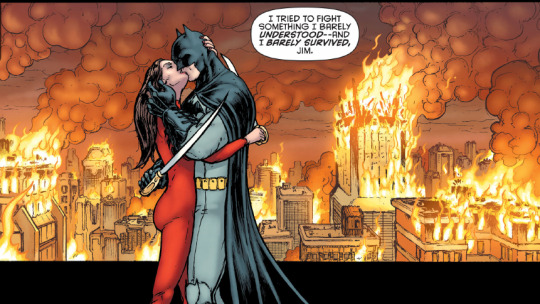


...seriously, everyone remembers the kiss but no one talks about how Bruce is still into it.
But anyway, so they make out, and she poisons him...

...then declares she’s doing all this as a gift to him, expresses frustration that he doesn’t understand, and demands that he beg her for help.
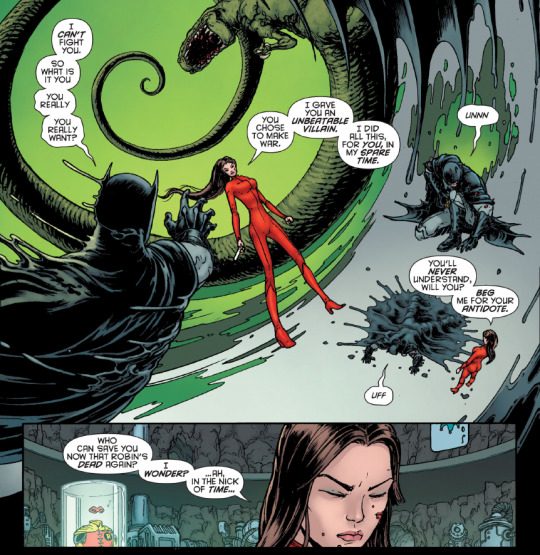
Here’s my point: she’s not actually trying to kill him or take the world down. She’s trying to force Bruce to submit to her, at which point she would feel satisfied and come back back from the edge. As evidenced by her earlier panels expressing her frustration that he won’t stop or admit defeat.

In fact, a great deal of what she does in Batman Inc. seems to be done to elicit a specific response from Bruce - for example, she has a hit put on Damian, but it’s really just to mess with Bruce’s head, it’s not really meant to result in Damian actually dying. I would say this comes back to this idea that the opposite of love is apathy not hate - love and hate are both intertwined and Morrison’s Talia both hates and loves him, or rather loves him until she hates him and hates him until she loves him.
This reminds me, one day I should write a thing about how Morrison’s Bruce/Talia story is basically a tragic romance and Talia is the actual love interest of his run... or should I because I don’t really want to be the person who writes longass meta about runs and interpretations that I actually hate.
Anyway, SIGNING OFF AGAIN, it’s...
Me!
#talia al ghul#dc comics#batman#fandom meta#batman meta#grant morrison#have i mentioned that i hate grant morrison's talia#because i do
34 notes
·
View notes
Text
One Marvelous Scene: “No Tears For Me?”
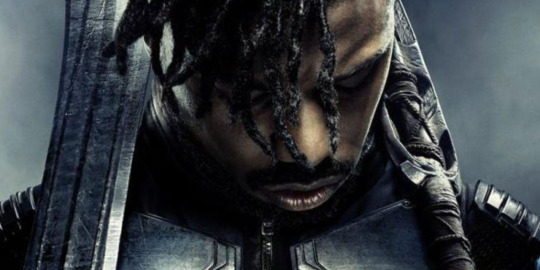
For those who follow a lot of YouTube writing channels you might have noticed a series this week put out by its top influencers titled “One Marvelous Scene.”
Much like how Nick Fury did at the end of “Iron Man,” in preparation for this weekend’s “Endgame” (EEEEEEEEeeee!!!) the channel Nando v. Movies tasked several other channels in doing a video about their favorite/most thought-provoking scene in the Marvel Cinematic Universe. This “One Marvelous Scene” could be anything from the iconic “I’m always angry” line from Bruce Banner in Avengers to an analysis of Captain America and the larger use of military ads within the series.
youtube
(Seriously, this is a little troubling when you think about it...)
Though I was, unfortunately, not called on to be apart of the writing Avengers (#sadface), the series did make me think about what scene has stood out the most to me in this series which now spans 22 movies (24 by the end of the year). Was it Cap’s iconic “I can do this all day line” that changed my perception of the character forever, Thanos’s epic entrance in “Infinity War,” or Cap and Bucky’s emotionally charged battle with Iron Man in “Civil War?”
No.
The scene that has stood out to me the most remains the only moment in any of these films where I almost cried (manly tears, damn it!) and that scene is Erik Killmonger’s journey to the Ancestral Plane in “Black Panther.”
The Ancestral Plain is my favorite setting in this film by a wide margin. It highlights a very spiritual and unique space in the MCU canon and contains the movie’s most emotionally charged moments. T’Challa’s own journeys into this realm are, by themselves, great scenes I considered choosing for this write-up as they highlight the arc of the character in his feelings toward his father and lineage. But Killmonger’s journey is especially powerful and shows why he’s regarded, by many, as the series most compelling villain.

(With all due respect to the Mad Titan of course. I’m speaking of course of Josh Brolin.)
The main theme of this story, to quote another famous Marvel character, quite clearly is “With great power, comes great responsibility.” In this case Wakanda has tremendous power, wealth and influence but they have chosen to hoard it and keep secret from the rest of the world. This negligence is highlighted first by Nakia earlier in the movie explaining how Wakanda can do so much more with the resources they wield but T’Challa chooses not to intervene because of “traditions.”
Erik’s arrival and subsequent takeover of the kingdom of Wakanda shows how that isolationism can have consequences. Erik is right to call out this kingdom’s hypocrisy and if this were any other type of movie he might’ve even been the main character in this story. Think about it: a prince rightfully points out injustice in a society, he is then killed without trial by his brother, his son then raise himself into the perfect warrior so that he may exact retribution and correct this flaw within the kingdom. Doesn’t that like the beginnings of a hero’s journey?
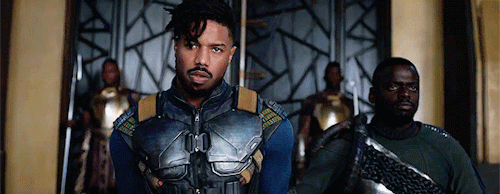
(*Menacing rap theme music intensifies*)
But it’s when he ventures to the ancestral plain that we really see the depth of this cruelty and the tragedy of how this society turned its back on one of its own. We see Erik revert back to being a child in this journey and see’s his father once more. This is an important because it shows how Erik once was, innocent, and through this we begin to understand just how far his fall has been and all because of one selfish, apathetic, irresponsible action.
youtube
When Erik’s dad asks him “no tears for me?” and he responds “Everybody dies. It’s just life around here” it becomes quite clear just how cruel it was for T’Challa’s father to leave him behind. The king, who T’Challa looked up to and admired, left a boy to fend for himself in a harsh world, with no one to help or guide him and for all intents and purposes appeared to never even attempt to go back and check in on him. And this wasn’t just any child; this was a blood relative, his nephew and he essentially left him to fend for himself because he wasn’t “one of them.” The creation of Erik Killmonger was entirely avoidable and yet it happened because Wakanda’s king wielded his privilege and influence of his kingdom irresponsibly all in the name of “tradition.”
In this way the film brilliantly highlights, especially later on when T’Challa returns to the ancestral plain, how king T’Chaka is the real villain of this film. When T’Challa tells his father and the rest of the former kings that they’re all wrong for turning their backs on the rest of the world it truly sends the message home how when you’re given a great power it is your responsibility to help others with it. Combine this genuine moment with Ludwig Gorransson’s Oscar winning score playing in the background and it’s hard not to get a little choked up during this tragic moment.
youtube
(Finally! An original soundtrack worth purchasing from the MCU!)
Contrary to popular belief, villains aren’t born villains in the real world; nobody comes out of the womb an evil, vindictive person. Evil people are created, often by even the most well-intentioned of people through negligence, cruelty and apathy. There’s a reason why MLK many decades ago said he feared “white moderates” more than he did the actual racists. It’s because those folks chose to turn their backs instead of using their privilege to help because it was convenient, much in the way T’Chaka did.
In a series that has largely chosen to cheapen most of its sincere drama with quips and bad jokes, this scene was a tremendous breath of fresh air for me when I saw it the first time. If this scene had been directed by almost anyone else in the MCU chances are there would’ve been at least one reference joke in here somewhere (“Ancestral Plane? Like am I going to see a Force Ghost or something? Derherherher.”) The emotional impact of this scene hit’s you like a sledgehammer when Erik’s dad says “No tears for me?” and thank Bast director Ryan Coogler didn’t try force in any bathos for cheap laughs.
youtube
(If you need a primer on what bathos means watch this great video by “Just Write”)
The MCU has done a better job in recent outings (mostly) with creating genuine moments of drama but at times still feels like they can’t help themselves. I want the MCU to be less afraid of itself in that way. We care about these characters and their stories; we don’t need a pop culture reference every minute to keep us invested in the story.
These films, space cowboys and spandex super heroes and all, can be so much deeper than the MCU allows it to be. “Thor: Ragnarok” is basically the same story as “Black Panther”; A soon to be king learns that his father wasn’t exactly the man he thought he was, a long-lost relative comes to usurp his throne and through this learns to be a better king and leader. The only real difference (besides the setting and characters used) “Black Panther” is sincere in its dialogue and doesn’t shy away from the tougher subjects.
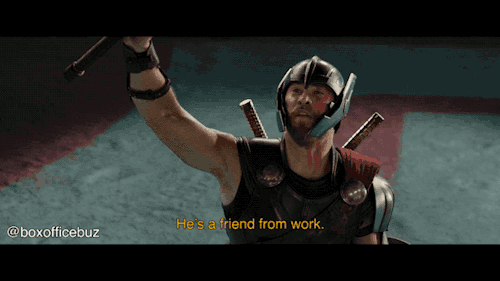
(We get it, it’s funny but c’mon...)
The Ancestral Plain is a powerful setting in “Black Panther” that helps complete arcs for its characters but its through Erik’s journey do we begin to understand the film’s main message. It’s a tragic scene and one that still sticks with me each time I watch the film and, in this day, and age we currently reside in in this world it feels very relevant as well. It’s one of the main reasons why “Black Panther” remains my favorite MCU flick to date and overall one of my favorite movies of the decade.
So While “Endgame” will certainly dominate at the box office this summer and more than likely be a huge crowd-pleaser I do hope that the MCU learns from this film as it travels into its new future. “Black Panther” showed you can tell one of these Marvel stories without adding a punchline in every minute and still be a huge success. Hopefully future films in this series understand this lesson too.
Glory to Bast. Wakanda forever. This is One Marvelous Scene.
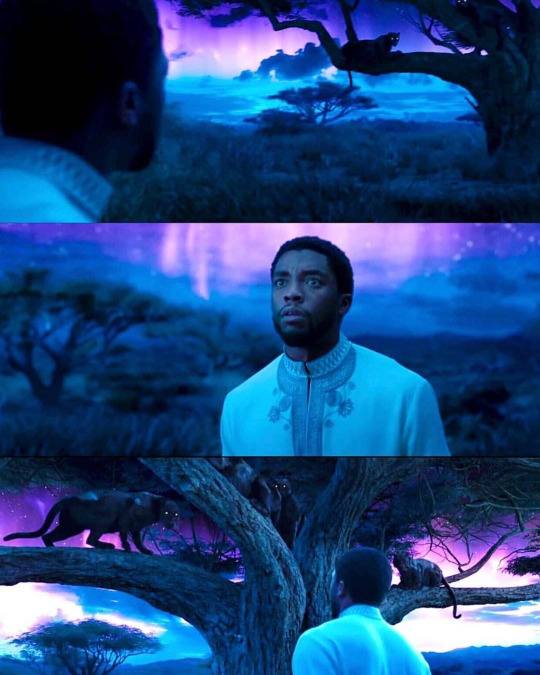
#One Marvelous Scene#Black Panther#erik killmonger#killmonger#Ryan coogler#MCU#marvel#marvel comics#marvel cinematic universe#Michael b Jordan#Endgame#Avengers#Avengers endgame#infinity war#wakanda#wakanda forever#bast#social justice#black lives matter#blm#comics#movies#film#movie essay#film essay
63 notes
·
View notes
Text
[Fantastic Fest Review] DARKLAND Explores the Real-Life Cost of Vigilante Justice
New Post has been published on https://nofspodcast.com/darkland-fantastic-fest-review/
[Fantastic Fest Review] DARKLAND Explores the Real-Life Cost of Vigilante Justice
Fenar Ahmad’s Danish thriller Darkland (Underverden, 2017), is a story of revenge that deconstructs today’s over-saturated superhero genre. Mirroring the seemingly heroic characters of comics books and graphic novels, Darkland imagines your average caped crusader at odds with the ramifications of their actions. As both a social commentary on class division and an exploration of the consequences of vigilante justice, Darkland brings a welcome degree of believably to larger-than-life genre.
Iraqui-born Zaid (Dar Salim) and his wife Stine (Stine Fischer Christensen) are only weeks away from celebrating the birth of their first child. A respected and skilled surgeon, Zaid left behind the community that raised him to enjoy a conformable lifestyle in the penthouse trappings of Denmark’s upper class. When his younger brother Yassin (Anis Alobaidi) comes asking for help from the gang life he was never able to escape, Zaid refuses him. A prideful man, who has likely never asked for help or favors, Zaid remains confident that his brother’s problems are not his own. But when Yassin is killed in a brutal attack, Zaid sets out to avenge his brother’s death.
Superheroes have changed how we see vigilantes, but revenge is a nasty business. Bringing brutal honesty to the subject, Darkland is a dark dive into how the vigilante justice presented in films would inevitably play out in “the real world”. Fueled by grief and frustration, Zaid’s noble quest for justice becomes an obsessive hunt for revenge. As a surgeon, Zaid sees the destruction of his crusade first-hand when his enemies begin to fill the emergency room. Unlike the many films that no doubt inspired him, Fenar Ahamad’s second feature is a deep character study that allows time for us the understand our hero’s motivation, struggles, and torment.
Dar Salim’s performance as a righteous killer is powerful, and ultimately frightening. As he navigates his way deeper into the criminal underground that swallowed his brother, Zaid is made to choose between his family and his need for retribution. Only a few moments in the film do we find ourselves actually cheering for Zaid. He is lost, searching for forgiveness and vengeance. Squaring off against a villain that claims to have done more to support their fellow Iraqui brothers in Denmark, Zaid is unsure if he is seeking to right the wrongs of his brother’s death, or balance the books of his own moral shame. Unable to reconcile the indifference he has for his own people, he becomes their protector when faced with the same apathy from the police. But unlike the superheros that shaped our sense of right and wrong, Zaid is not invincible. He does not have super powers, and he does not live in a world that will pardon the monster he must become.
It seems inevitable that the film will be adapted for American audiences. (All bets on Vin Diesel in the leading role.) Cut and paste the characters into New York, double the action sequences, add a motorcycle chase or two, and place a stronger (sickeningly sentimental) focus on the importance of Family– and you’ve got yourself an American adaptation. Turning the Batman story on it’s head, Darkland showcases the truly bleak darkness that can consume a person so focused on personal revenge. While this deep, psychological torment is usually absent in American heroes, Zaid’s story allows audiences a look into the world where happy endings are rarely found.
Released earlier this year in Denmark through Profile Pictures, Darkland was shortlisted for the country’s official Best Foreign Language Film selection for the 90th Academy Awards. Though Peter Schønau Fog’s You Disappear (Du Forsvinder, 2017) was ultimately selected, Darkland has succeed in presenting a familiar revenge plot, framed in strong cultural relevance. American audiences will recognize the class struggle at the core of this film, though the specifics of the turmoil in Zaid’s world may be lost in translation.
As someone who has outgrown the repetition of the superhero story, Darkland is the first crime-fighter story in years that has pushed the genre forward. Fenar Ahmad’s exploration of revenge is a bold, original take on a genre so familiar I almost (regrettably) skipped this film. Dar Salim’s subtly expressive performance almost brought me to tears in several scenes. In a year that I vowed to avoid all things Marvel & DC, watching this strong, bull-headed man allow himself to feel guilt and grief, and a sick sense of duty has been one my favourite movie-going experiences. Utilizing the fast paced, glossy cinematography tricks of blockbuster action flicks, Darkland tells a quiet, personal story of a man that takes up a cause, at the cost of everything he hopes to defend.
3/4 eberts
youtube
#crime drama#danish#Dar Salim#darkland#denmark#fantasic film festival#fantastic fest#Fenar Ahmad#revenge#review#superhero#thiller#vigilante
0 notes